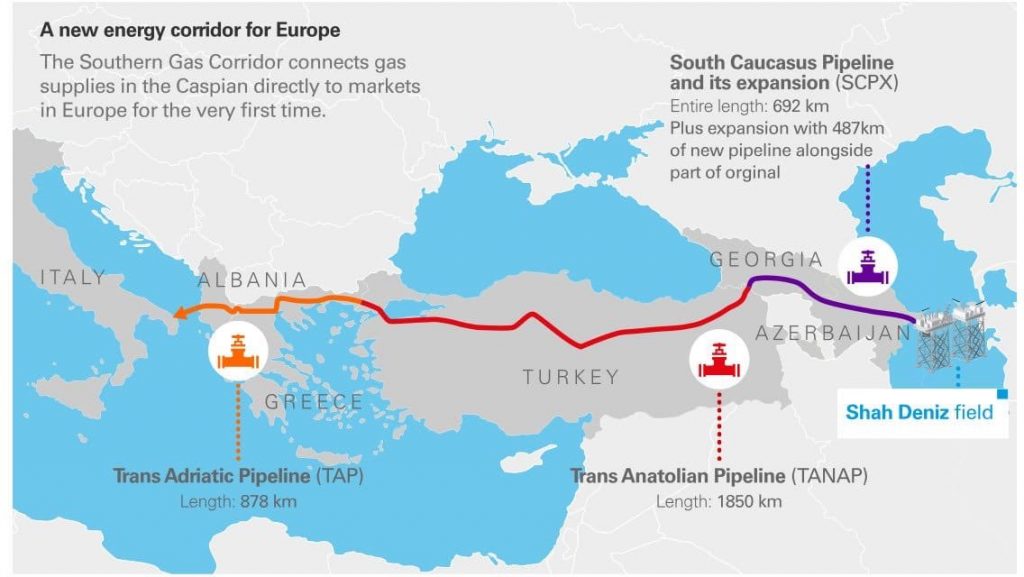With TANAP, Turkey Takes a Big Step Toward Becoming Energy Hub
With the inauguration of Trans-Anatolian Natural Gas Pipeline (TANAP) this week, Turkey has taken a very important step to diversify its energy supplies and, more significantly, to become an energy hub in the region, experts have said.
“Our country is now one step closer to its vision to become a hub of energy lines thanks to TANAP,” President Recep Tayyip Erdogan said during his speech at the inauguration ceremony in the central province of Eskisehir on Tuesday. He called the project “the Silk Road of energy.”
Azerbaijani President Ilham Aliyev, Ukrainian President Petro Poroshenko and Serbian President Aleksandar Vucic were all present at the ceremony. The $8.5 billion TANAP is a key part of the Southern Gas Corridor (SGC).
“This is part of a broader Turkish vision or strategy to become the energy hub of the world. Europe is very keen to diversify its gas dependency on Russia. The gas has been used as leverage against the EU by Russia, any form of diversification will be welcomed by the EU,” said Alan Mohtadi Head of T&S Consulting Energy and Security.
In remarks to Globe Post Turkey, he argued that Turkey, along with Russian state companies and the Kurdistan Regional Government (KRG), is hoping to start exporting oil and gas from Kurdistan region in the coming years.
So, the EU is hoping to diversify both the routes and supply from its eastern neighbor. But, he noted, in recent years Putin has developed close ties with Erdogan and Erdogan’s government has used the migration crisis as a leverage against the EU. So for Europe, it is a balancing act they have to make, as long as they don’t want to be over-dependent on the Turkish goodwill for energy.
TANAP project has had firm backing from both the U.S. and the EU.
Sandra Oudkirk, deputy assistant secretary in the U.S. Bureau of Energy Resources, said on Tuesday that TANAP would bring diversification of supply and energy security to European countries and to Turkey.
“TANAP is a strong additional element for energy security for Turkey and Europe. The U.S. government supports the project on a policy basis,” she said.
According to Mohtadi, the good news for Europe are not without its challenges and long-term risks. “I don’t believe dependency on a more authoritarian Turkey for its energy needs is the long-term strategy or will of the European Union that could want,” he said, underlining that Turkey will have more leverage against the EU in relations.
Brussels and Ankara went through a series of rows especially after Erdogan’s government launched a purge against real and perceived opponents in public service in the aftermath of a failed coup in July 2016. The post-coup crackdown and widespread human rights violations appear to be a lasting source of friction between Turkey and the EU.
The need for cooperation to keep a fragile migration deal functioning served as a bulwark against the full-scale breakdown of the strained ties.
Implications of TANAP for Europe, for Energy Geopolitics and Energy Markets
TANAP is an important economic and political development for Azerbaijan, Turkey as well as the European Union (EU), Slawomir Raszewski, a senior research associate at the European Centre for Energy and Resource Security (EUCERS) at King’s College in London, told Globe Post Turkey.
“Politically, TANAP is very much welcomed by the EU. The pipeline’s construction was endorsed by the bloc (as well as the US) serving one of the stated objectives of the EU’s external energy policy centered around the diversity of supplies,” he said in an emailed statement.
He noted that the EU’s external energy policy promotes the SGC concept aimed at facilitating imports of new sources (and routes) of natural gas from the Caspian region and TANAP does exactly that.
According to him, the pipeline has been termed as ‘strategically important’ by European Commission Vice-President Maros Sefcovic who suggests that despite fairly modest volumes earmarked for the European market, TANAP serves as an important milestone in the realization of the EU’s policy in general and the SGC concept in particular.

Raszewski emphasized that energy geopolitics has been on the agenda in the region for quite some time starting with the two landmark projects commissioned in the 2000s: the Baku-Tbilisi-Ceyhan (BTC) crude oil pipeline and the Baku-Tbilisi-Erzurum (BTE, also known as the South Caucasus Pipeline) natural gas pipeline.
“The BTC and BTE pipelines connected Azerbaijan via Georgia to Turkey and, ever since offered an alternative perspective on regional cooperation, geopolitics as well as security,” he said. Now, TANAP extends further on all the way across Turkey and, once the Trans Adriatic Pipeline (TAP) is built, TANAP will serve as the centerpiece of the SGC concept connecting Azerbaijan’s fields with Europe.
Economically, he argued, the TANAP solidifies the position of the State Oil Company of Azerbaijan Republic (SOCAR) on the Turkish energy market. SOCAR holds a majority, 58% share in TANAP project company (Turkey’s BOTAS 38% and BP 12%). To date, he said, the company has invested circa 20 billion US dollars in Turkey helping to diversify the country’s natural gas supply.
TANAP shows Turkey is indispensable partner of EU's energy security… pic.twitter.com/dKkPvBmXN0
— Alper Üçok (@AlperUcok) June 12, 2018
With 6bcm earmarked for Turkey, TANAP makes an important contribution to the country’s existing natural gas supply mix, Raszewski said.
He added: “Gas supplies to Europe are important, too. Here the picture may be more nuanced. EU as a bloc is set to receive 10bcm of natural gas which may be seen as fairly modest at this stage but – due to the bloc’s policy objectives – significant enough.”




Comments are closed.